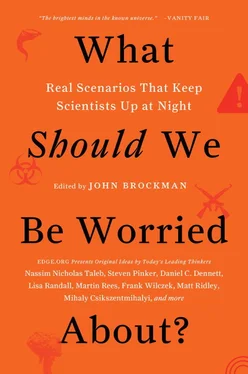SUSAN BLACKMORE
Psychologist; author, Zen and the Art of Consciousness
I don’t mean that someone is going to come and chop our hands off. I mean that we are unwittingly but eagerly outsourcing more and more of our manual skills to machines. Our minds are losing touch with our bodies and the world around us and being absorbed into the evolving technosphere.
To begin with, we created machines to do our bidding and make our lives easier and more enjoyable, but we have failed to notice how quickly that relationship is changing. What began as master and servant is heading for “obligate symbiosis,” a state in which neither can survive without the other.
These machines include everything from the high-powered physical machines that build our roads or harvest our crops to the thinking machines in everything from toasters to Internet servers. Engines and cranes very obviously relieve us of heavy manual labor, but in the process they also change the nature of our minds. This is because manual skills are really not just about hands; they are about the way our brains and hands interact. When I learn how to plant potatoes, turn a chair leg, or replace a roof tile, I am not just learning intellectually how far apart to space the tubers, or the principles of using a lathe; I am involving my whole body and mind in learning a new skill. This takes time and practice. It changes me gradually into someone who will more easily learn how to grow beans, carve a chair seat, or mend the gutters.
We can see the loss of these skills in the obvious fact that fewer people now learn them. How many of us could build a waterproof shelter, make furniture, or even grow our own food? These memes still survive, especially in less developed cultures, but the numbers are falling. Just as worrisome is changing attitudes. For example, in the British education system, crafts like woodworking and cooking or trade skills like bricklaying and plumbing are now tested more by written exams than by what students can actually do. This is meant to raise the status of these subjects, but instead it turns them into purely intellectual knowledge, belittling the important manual skills that take so much practice to acquire. Every time we build a machine to do something we previously did ourselves, we separate our minds a little further from our hands.
Perhaps less obvious is that the same process is going on as we enthusiastically adopt communications technology. When we began using e-mail, it seemed a handy replacement for the slow process of sending letters. When we got our first mobile phone, it seemed just a more convenient way of talking to people. But look at smartphones now. No one can compete in today’s world without using at least some of this technology. Opting out to become “self-sufficient” is even more hopeless than it was in the 1970s, when many of us flirted with the idea.
Yet somehow we cling to the notion that because we invented these machines in the first place, they are still there for our benefit and we can do what we like with them. This is obviously not true. From a meme’s-eye perspective, it is the technomemes and the wonderful machinery that copies, recombines, stores, and propagates them that benefit—not us. It is they who are rapidly evolving, while our bodies hardly change at all.
But the way we use them is changing. Our hands now spend little time making or growing things and a lot of time pressing keys and touching screens. Our brains have hardly changed in size or gross structure, but their function has. Our evolved desires for fun, competition, and communication lead us into ever vaster realms of online information and away from the people right next to us. And who are “we”? Our selves, too, are changing as they disconnect from our bodies, becoming as much the person who exists on multiple Web sites and forums as the physical body who acts and interacts right here and now—as much a digitally propagated entity as the man now holding my hand in his.
So what should worry us now is our role in this world. If we are not masters in control of our technology, who or what are we becoming?
Here is a possible analogy. About 2 billion years ago, mitochondria evolved from primitive bacteria by entering into a symbiotic relationship with early eukaryotic cells. Each benefited the other, so this was not a hostile takeover but a gradual coming together until neither the living cells nor the mitochondria within them could survive without the other. The cells feed and protect the mitochondria; the mitochondria provide the power. Could our future be heading in that direction? The analogy implies a world in which humans manage the power supplies to feed an ever increasing number of inventions, in return for more fun, games, information, and communications—a world in which we so value the fruits of our machines that we willingly merge both physically and mentally with them.
The prospect looks bleak. The demands of this evolving system are insatiable, and the planet’s resources are finite. Our own greed is insatiable, and yet its satisfaction does not make us happier. And what if the whole system collapses? Whether it’s climate change, pandemics, or any of the other disaster scenarios we worry about, there might indeed come a time when the banks collapse, the power grids fail, and we can no longer sustain our phones, satellites, and Internet servers. What then? Could we turn our key-pressing, screen-swiping hands to feeding ourselves? I don’t think so.
What should worry us is that we seem to be worrying more about the possible disasters that might befall us than who we are becoming right now.
CHRISTINE FINN
Archaeologist, journalist; author, Artifacts: An Archaeologist’s Year in Silicon Valley
My worry? Losing touch.
Biologists at the University of Newcastle, U.K., recently published a report claiming that fingers wrinkling in a long bath was a sign of evolutionary advantage. The prunelike transformation provided the digits with a better grip. More than helping one to grasp the soap, this skin puckering suggested itself as a factor for survival, as our Mesolithic ancestors foraged for food in rivers and rock pools.
That widely reported reminder of our evolved capabilities helped assuage my own real worry—call it, perhaps, a haptical terror—about losing touch with the physical world. What is the future for fingers, as tools, in the Digital Age? Now that the latest interface is a touch that is smooth and feather-light, and human-to-machine commands are coming to be spoken, or breathed, or blinked, or even transmitted by brain waves, will finger-work be the preserve solely of artists and child’s-play? Fingers could still form churches and steeples and all the peoples, be in the play of poets, peel an orange. But in the Digital Age, will there be pages still to turn, tendrils to be untangled, a place for hard keystrokes, not simply passing swipes? After all, the digit, birthmarked with its unique code, is our security guard, a hush as much as the finger placed to the mouth.
But the fingers are fighting back.
We are encouraged to wield kitchen tools, find grandma’s sewing box. To beat eggs, pound dough, and ice cakes; to join knitting circles; to plunge our hands into landscape to pick wild food. Things are still palpable; real book sales are encouraging, and we are still hooked on marginalia and turning down the corner of a page.
A few months ago, I visited the Florida house where Jack Kerouac wrote Dharma Bums in an ecstatic burst of typing over eleven days and nights. In this refuge from New York critics of On the Road , his fingers translated brain to hand to brain, synapses sizzling from caffeine and Benzadrine. In these wooden rooms nearly sixty years later could be heard the distinctive sound of a metal typewriter. Not Jack’s ghost pounding out but the latest writer-in-residence, a young woman in her twenties who, it transpired, had arrived from Ohio with both a laptop and a vintage manual typewriter, to know what it felt like.
Читать дальше












